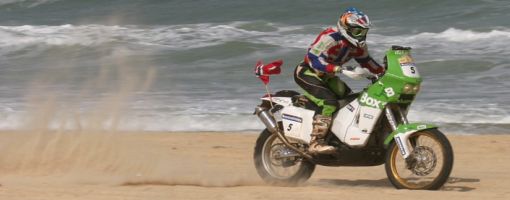Rally Dakar passes through an occupied country

Today, the rally circus speeds through Western Sahara, a desert country occupied by Morocco. The serious human rights violations in the country is a non-topic, both for the organisers, the participants and visiting journalists.
Published 14 January 2007
By: Anne Torhild Nilsen and Rådmund Steinsvåg
ABC Startsiden/Neste klikk, Norway
11.01.2007
Today´s stage goes from Tan Tan in Morocco, through Western Sahara, and ends up in Zouerat in Mauritania. A large crowd of press people are trailing the gigantic rally circus. The number of journalists that are present in Western Sahara for just today exceeds the the number of journalists arriving over the course of several years to cover of the deadlocked political conflict. Still, the Western Sahara conflict is a non-topic, all attention being paid to covering the stage. This fact holds for both the journalists as well as the organisers. Although the name of the country is written on the rally map, there is no mention of Western Sahara On the rally organisers´ official home page.
Ronny Hansen, chairman of the Norwegian Support Committee for Western Sahara, holds that the omission of Western Sahara reflects the organisers' wish to avoid trouble:
"By not mentioning Western Sahara as a separate country, they avoid provoking Morocco who considers Western Sahara as being a part of Morocco. Also, by not mentioning Western Sahara when describing Morocco, they avoid provoking the Western Sahara liberation movement, Front Polisario. The organisers make every effort to avoid statements and presentations that may arouse protests. The organisers have experienced that both Polisario as well the occupying country, Morocco, have reacted very strongly to the way the territory has been defined and referred to", Hansen says.
Situation worsened
The human rights situation in Western Sahara has deteriorated significantly during the last year. To an increasing extent, those who ask for independence from Morocco are being threatened to silence. Local human rights activists report that there are police and military personnel on every street corner and that people are being beaten up every day. However, these acts of torture, harrassment and illegal imprisonment are not enough to make Western countries react. Consequently, the population shows symptoms of increasing despair and despondency. Young men who previously were actively demonstrating against the occupation are now fleeing to the Canary Islands.
The major part of the population is still living in refugee camps in Algeria. Those who stay behind have become a minority in their own country. Apparently, no countries or institutions wish to taking tough action for the sake of liberating the last remaining colony in Africa.
Avoiding politics
The territory which the Norwegian motor cyclist Pål Anders Ullevålseter and his fellow competitors are riding through, has been disputed for more than 30 years. Significantly, on his home page, Mr Ullevålseter has stated that Western Sahara is one of the countries that the rally goes through. However, he is not willing to make any comments about the conflict or human rights violations in the area, according to his PR manager, Mrs Solveig Våge Ullevålseter:
"We have stated that Western Sahara is one of the countries that he drives through, because we want to give an exact account of the route. We support the policy of the Norwegian Foreign Office, but beyond this we do not want to make further comments regarding the conflict. He is a sportsman, not a politician. He adheres to the route that the organisers have arranged," Mrs Ullveålseter says.
Ronny Hansen, of the Support Committee, appreciates that the participant is not willing to comment, but he is disappointed that so few journalists take an interest in this political conflict. But Hansen begs that both the participants and the management take due consideration to the fact that one of the stages in the rally goes through occupied land.
Expelled population
"The organisers should be fully aware that the rally passes through a territory that is under military occupation, and where a majority of the population has been expelled and are now living in refugee camps in the Algerian desert. Every year the Rally Dakar management should make certain that Polisario accepts the passage of the rally through their country, and that the event in no way lends legitimacy to the occupation. After all, the rally is carried out in cooperation with the military forces of the occupying power. The organisers have not been sufficiently attentive to this in the past, but we have noticed some improvement, " Hansen says.
He also requests the organisers to treat Western Sahara in the same way as they treat the other countries, and consequently pay Polisario a fee, of the same order of magnitude as the other countries receive.
"Such support will be of great benefit for a refugee population that has lived in tent camps in Algeria for more than 30 years, with most of their basic needs unmet," Hansen says.
No one from the Rally Dakar management team has for the last three days responded to requests for a comment on the Western Sahara conflict.
[Translated from Norwegian by the Norwegian Support Committee for Western Sahara. Norwegian original: "Rally Dakar gjennom okkupert land"]
News
NY Check new Western Sahara poster!
“Try to Visit Western Sahara”…
10 July 2020
The Security Council fails Western Sahara and international law
On 31 October 2025, a new resolution was adopted in the UN Security Council calling on the Saharawis to negotiate a solution that would entail their incorporation into the occupying power, Morocco.
03 November 2025
Saharawis Demonstrate Against Trump Proposal
The United States has proposed in a meeting of the UN Security Council on Thursday that the occupied Western Sahara be incorporated into Morocco.
28 October 2025
Skretting Turkey misled about sustainability
Dutch-Norwegian fish feed giant admits using conflict fishmeal from occupied Western Sahara. Last month, it removed a fake sustainability claim from its website.
27 October 2025



